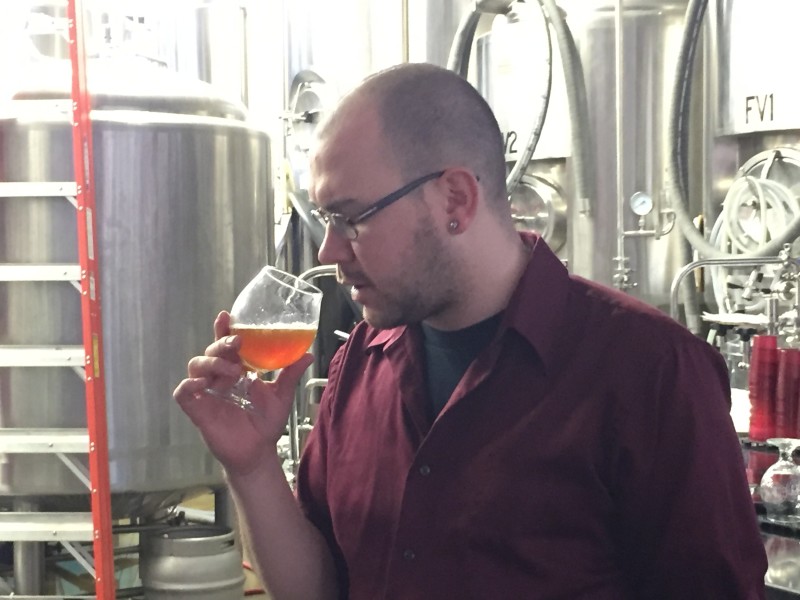

If you work in the beverage industry, chances are, you’ve heard of a Sommelier.
A Sommelier isn’t just a wine-lover, but a certified wine expert; not just a waiter giving casual suggestions, but rather someone who has undergone special training to become highly knowledgeable in all aspects of wine service. A Sommelier’s responsibilities include developing wine lists, training restaurant staff, and working with the culinary team to pair wines that complement food ideas.
The first Sommelier examination was held in the UK in 1969. Thirty-eight years later, the first Cicerone Certification exam was held.
A Cicerone is to beer what a Sommelier is to wine.
About twenty or thirty years ago, beer was much simpler. Although a Sommelier’s primary expertise was wine, he or she was also expected to understand a good amount about beer. However, beer has come a long way since then. Many experts believe that today’s beer is just as complex and diverse as wine. Now, in order to be considered a true beer expert, you must earn a Cicerone certification.
The word “cicerone” (sis-uh-rohn) means “a guide who explains the history and chief features of a place to sightseers.”
Ray Daniels, an experienced home brewer, author, and event and festival organizer, started the Cicerone Certification Program in 2007.
Currently 48,866 Americans have some type of Cicerone certification.
The program covers five areas of study:
There are four levels of certification:
Because it’s the first level of the Cicerone program, the Certified Beer Server certification doesn’t require any prerequisites (you don’t even have to be allowed to drink!). In order to get the certification, you have to pay $69 and take an online exam. The format is 60 multiple choice questions. In order to pass, you must get a 75% or above.
To prepare for the exam, you can read the syllabus, click through the free study links page, or purchase additional study materials.
Certified Beer Servers should have competent knowledge of:
Currently, there are 46,887 Certified Beer Servers in the US.
To qualify for this certification, you must be a Certified Beer Server of legal drinking age. The exam costs $395 and includes a written section with short answers and essay questions as well as a demonstration section. In order to pass, you need to get an 80% overall and at least 70% on the tasting section. Certification exams are held throughout the US and sometimes in Canada. You can check the schedule here.
To prepare for this exam, you can look over the syllabus and a number of study resources recommended by cicerone.org. It’s also recommended that you participate in brewing a batch of beer (homebrew or professional) and practice tasting for off-flavors.
Certified Cicerones should have detailed knowledge of:
There are currently 1,867 Certified Cicerones in the US.
The third level of beer certification requires the two previous levels of certification and the participant must be of legal drinking age. The day-long exam costs $595 and is composed of multiple written, oral, and tasting components. The written section of the exam consists of multiple choice, fill-in-the-blank, and essay questions and there are two oral sections that include hands-on beer presentation and a taste assessment.
To pass this exam, you need to get an overall grade of 80% and at least a 75% on the tasting portion. The Advanced Cicerone certification exam is held several times a year in a number of different locations. If you’re looking to take the test, the dates and registration information are announced through an email blast so make sure the email address associated with your Cicerone profile is up-to-date.
To study for this exam, you can read over the full Advanced Cicerone guide and look over a number of other resources. The Cicerone program also recommends you travel to classic beer producing areas of Europe, brew beer alone or with others, and experience preparing and presenting beer and food pairings.
Advanced Cicerones are expected to have expert knowledge of:
The Cicerone.org Certification Directory currenlty does not provide a list for Advanced Cicierones.
The fourth and final certification is Master Cicerone. To take this exam, you must have passed the Advanced Cicerone exam (starting in 2018) and you must be of legal drinking age. The two-day exam costs $895 and includes multiple written, oral, and tasting components. The written section is made up of essay questions, the oral exam is conducted by industry experts and includes hands-on presentations of knowledge and the taste-test requires recognition of a range of off-flavors, a blind assessment of beer styles, and an analysis of blind sampling. To pass, you must get an overall grade of 85%. The Master Cicerone exam is held twice a year in Chicago. The dates and information are communicated via email if you have an account on cicerone.org.
To prepare for this exam, cicerone.org recommends reading these resources. However, they also generally expect that you’ve spent years studying and tasting beer, you’ve traveled to classic beer producing areas, you’ve had hands-on experience with beer service and food pairing, and you’ve brewed beer alone or with partners.
Master Cicerones have:
Currently, there are only 8 Master Cicerones in the US.
Because I haven’t taken a Cicerone exam myself, I was curious what the process was like. After reading his article, “The Road to Becoming a Beer Sommelier,” I reached out to Certified Cicerone, Sean Cooke from St. Paul MN, to see what his experience was like and where his certification had taken him.

“I opened my own bar in 2012 and wanted to build a craft beer program. Originally, I didn’t know a whole lot about beer but I wanted to build a nice balanced tap list with something for everyone. There were a number of new breweries that were popping up that quickly became staples on my tap list. I became known for having cool local beers and we quickly became a craft beer bar. I then had lots of customers coming in and talking about beers with me. They would mention a style that I didn’t know and I would go home and research it. Pretty soon, I became known as a beer expert.”
“I owe a lot to my brewing partner, Gill, also. He was the one in charge of the taps at another bar in the same neighborhood. We would visit each other’s bar 2 to 3 times a month and compare our theories on making a balanced tap list. He mentioned he was a homebrewer and we began brewing beer together.”
“It was then that I began studying for the Cicerone exam.”
“The Cicerone exam was one of the hardest things I had ever done. It’s long, it’s intimidating, and I had to travel to Chicago because of timing to take it. I spent a lot of late nights reading articles, reading books, and watching videos on beer styles, beer history, and the brewing process. One of the hardest things was not knowing where I stood. I knew I was a beer expert, but I had no point of reference. I basically spent a year studying casually for it and then 3 months studying intensely.”
“I think the hardest part is having to drink beer when you don’t want to, or to drink a particular style of beer when you’re not in the mood after a long day of work. A lot of people joke about how hard it must be for me to ‘have to’ drink beer as part of my studying or my profession, but it’s mentally and physically draining.”
“I only got my job as a manager at the startup, Better Beer Society, because I was a Certified Cicerone®. That was the minimum qualification for my position doing the education pieces. I work with 5 other Certified Cicerones® in my company and there are 3 of us looking to move on to the Advanced Cicerone® level and one who has his sights set on Master Cicerone®.
“Better Beer Society is an education-based beer business that is seeking to build a more educated industry from all angles. We have four major parts of the company:”
“I’ve gained a huge amount of credibility and respect in this industry. I’ve been contacted by a number of people after reading my article that wanted to do training. A few months after I became certified, a friend of mine, who owns a local brewery called me to ask if I would do quality control for their beers. I go in once a week and get paid to drink their beer and discuss the flavors to make sure they are consistent batch-to-batch. I really appreciate their dedication to quality and am happy to be a part of that process.”
“I’m also the taproom manager at Lake Monster Brewing in St. Paul, MN. We just opened the taproom in December. The company and the brewer are amazing. I’m in charge of staff training so that we have educated bartenders that can answer any of the questions the general population may have. I also work with the brewer tasting the beers and discussing the direction of the tap list. We have nothing but outstanding beers, which is the only reason I would work there.”
“Lastly, the certification gives me something concrete to tell people and let them know my knowledge and experience level. I’ve heard people say that they go to breweries all the time or talk about how many beers they have rated on those beer social media apps on their phone as if that’s some sort of credential. I have something concrete, vetted by the Cicerone Certification Program.”
“I would definitely encourage others to go through the Cicerone Program. It is one of the few ways to actually have a benchmark for expertise. I am constantly surprised at the level of misinformation that’s being spread throughout the market. There are far too many self-proclaimed beer experts out there. This program is a way to back it up.”
As you can see, if you’re looking to further your career in the beer industry, a Cicerone certification can be extremely beneficial. Consumers are constantly asking for recommendations and guidance. If the Cicerone certification interests you, be sure to check out their website for next steps.

Excellent article, and EXACTLY the starting point I was looking for!
I’m a hospitality marketing professional and specialty beverage business owner who’s been a craft beer geek for nearly two decades. I’ve worked on the distribution tier with AB in an on-premise sales and marketing capacity and learned a TON, but recently I’ve really felt a massive pull to take my knowledge and beer fanaticism to a CERTIFIED level of expertise, and completely shift my career in the craft beer direction.
This article is packed with inspiration and (most importantly) useful links and background expectations.
Thank you! 🙂